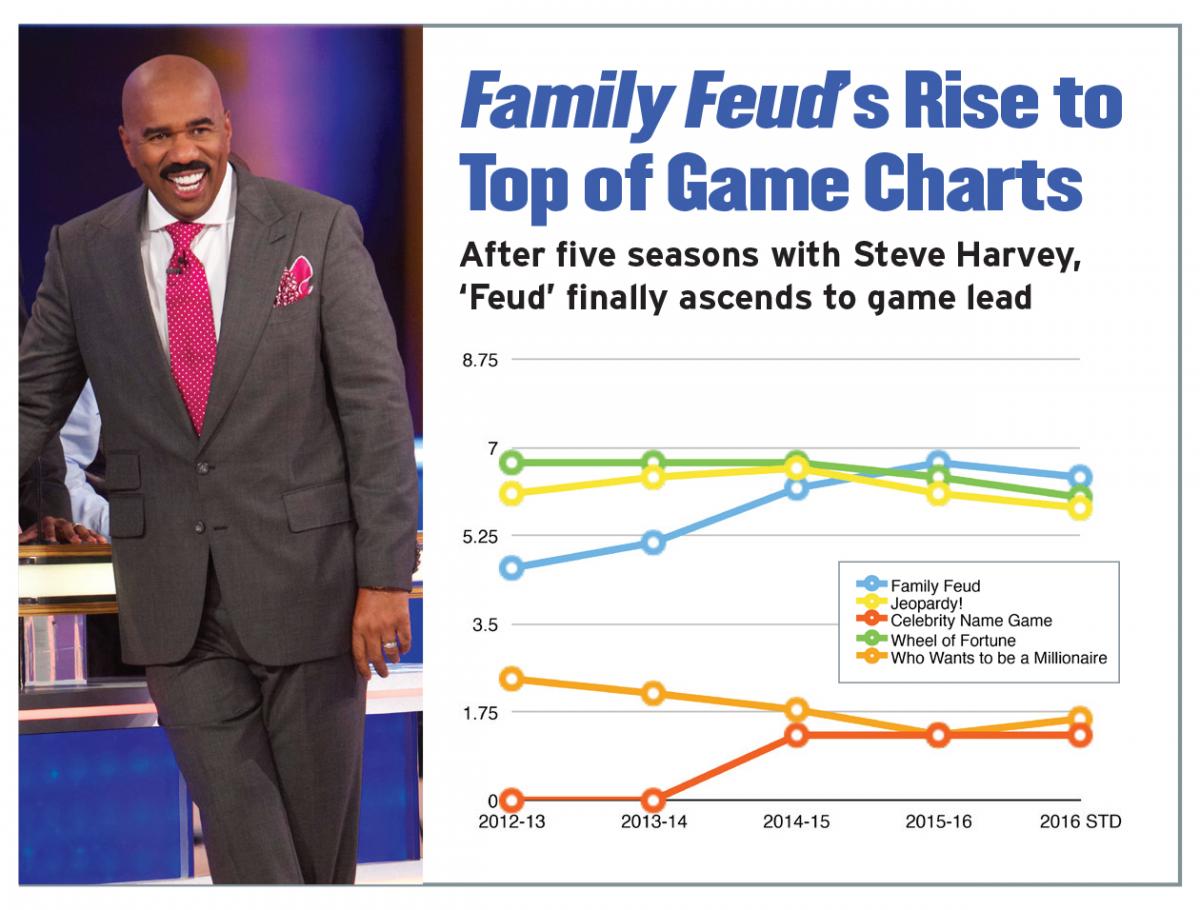'Family Feud' Cements Its Winner Status

The smarter way to stay on top of broadcasting and cable industry. Sign up below
You are now subscribed
Your newsletter sign-up was successful
While the business of television seems to be shifting at the speed of light, the pace of change in syndicated television is somewhat slower.
For example, CBS Television Distribution’s Wheel of Fortune was the top-rated syndicated game show in households from 2004-14, at which time CTD’s Jeopardy! briefly overtook it in the week ended June 1, due to contestant JuliaCollins’ 20-game winning streak. That’s also when Debmar-Mercury’s Family Feud was on the upswing, but still solidly third at a 4.7 household ratings average, according to Nielsen. The Jeopardy! win was a one-time occurrence, and Wheel quickly reassumed its position at the top of the game-show heap.
Fast forward to summer 2015—Family Feud, starring Steve Harvey, started repeatedly beating its rivals. Soon, a trend turned into a streak, and 25-plus weeks ago, Feud took over the game lead and hasn’t given it back. In the week ended Oct. 16, FamilyFeud hit a season-high 6.6 in households to lead all games and take second place in overall syndication behind only CTD’s indomitable Judge Judy.
Feud also leads all of first-run syndication among daytime’s key demographic of women 25-54, finishing the week ended Oct. 16 at a 2.9, edging out Judy by a tenth of a ratings point at a 2.8.
It’s been well documented, but Feud’s success stems from producer Fremantle-Media North America and distributor Debmar Mercury hiring Harvey to host the format in 2010. At that time, John O’Hurley was hosting and the show was averaging a 2.0 in households and a 1.0 in women 25-54.
Harvey brought his reactionary brand of humor and his strong rapport with contestants to the show and the rest is history: Family Feud has soared ever since.
When stations saw how well Feud was doing, they started requesting more runs. Today, Family Feud often runs four times a day in local markets, and it also airs many times a day on cable network GSN. All of those airings combine to create its overall rating.
The smarter way to stay on top of broadcasting and cable industry. Sign up below
Debmar-Mercury and Fremantle-Media make sure to keep stations well stocked, producing 200 new episodes each year, while also allowing stations to access the 400 episodes from the previous two years in every three-year deal.
“Part of our pitch is that if you do a three-year deal with us, you get 200 brand-new episodes and a trailing 400 episodes,” says Ira Bernstein, copresident of Debmar-Mercury. “If you have Modern Family or The Big Bang Theory or any other sitcom, you are lucky if you get 200 episodes total.”
Meanwhile, Wheel of Fortune and Jeopardy! have mostly stuck with the strategy they’ve always used: air once (or maybe twice, in the latter’s case) on one station in a market, usually in access, and remain exclusive to that station.
“[Late CTD CEO] Roger King was always old school about driving people to the over-the-air broadcaster. We’ve remained pretty true to that philosophy over the years and I think it’s been beneficial,” says Steve Hackett, president, sales, CTD. “It’s so important to television stations to have really great shows in this environment of 0.4s and 0.5s. Our game shows consistently deliver a great show every night and the viewer knows there’s only one place to see it in his or her market, it makes such a difference.”
CTD also turned a challenge into an opportunity after E.W. Scripps opted out of carrying both games in access four years ago, and instead started running less expensive independently produced shows, Let’s Ask America and The List. Let’s Ask America was ultimately canceled, but Scripps still runs The List, often paired with another Scripps-produced show, The Now. Meanwhile, Wheel and Jeopardy! moved to other stations in those markets, and those stations were happy to pay robust license fees for the high-rated veteran games.
Disney-ABC’s Who Wants To Be a Millionaire, now in its second season with host Chris Harrison of The Bachelor fame, is seeing an uptick this year, largely because it’s moved back into daytime slots on major-market ABC stations, paired with viral video show RightThis-Minute. The two shows are filling the hole left by the cancellation of panel talker FABLife.
Finally, Debmar-Mercury’s Celebrity Name Game, now in its third season, remains very steady at a 1.3. While Tribune appears happy with the show in daytime slots, its future is not assured as some station groups consider whether they’d rather create locally produced programming than rely on lower-performing shows from outside producers.
“The headline with Celebrity Name Game is that where it hasn’t moved and is supported, it really does well,” says Jennifer Mullin, coCEO of Fremantle-Media North America, which produces the show. “There are strong examples of markets where it is growing, if stations can just hang on and let it build its following.”
Contributing editor Paige Albiniak has been covering the business of television for more than 25 years. She is a longtime contributor to Next TV, Broadcasting + Cable and Multichannel News. She concurrently serves as editorial director for The Global Entertainment Marketing Academy of Arts & Sciences (G.E.M.A.). She has written for such publications as TVNewsCheck, The New York Post, Variety, CBS Watch and more. Albiniak was B+C’s Los Angeles bureau chief from September 2002 to 2004, and an associate editor covering Congress and lobbying for the magazine in Washington, D.C., from January 1997 - September 2002.

